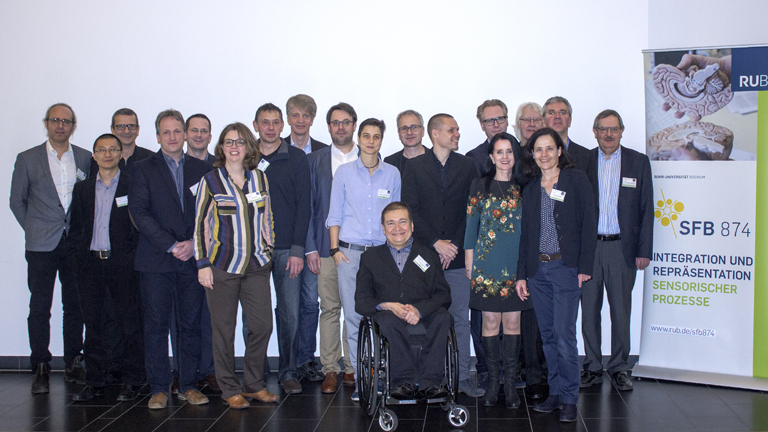
Memory Research at the RUB receives a further boost:The SFB 874 has been awarded funding for a third research period by the DFG
The SFB 874 examines how cognition and complex memories arise through sensory information
The Deutsche Forschungsgemeinschaft will finance the Collaborative Research Centre “Integration and Representation of Sensory Processes” (SFB 874) for four more years. The interdisciplinary research consortium was established in 2010 at the Ruhr-Universität Bochum (RUB). Its goal is to investigate how the brain processes sensory inputs into complex behaviour, cognition, and memory. The new funding period, supported with 8.2 million euros, starts on 1st July 2018.
Outstanding cooperations between fundamental and clinical research
The SFB 874 will integrate three new research projects into the third funding phase that involves a total of 15 scientific projects from the faculties of Biology and Biotechnology, Medicine, and Psychology as well as the neurological clinics of the Universitätsklinik Bergmannsheil and the Knappschaftskrankenhaus. “We plan to develop several research lines of enquiry and we will work together on challenging new questions in the area of brain research.”, says SFB-speaker Prof. Dr Denise Manahan-Vaughan.
Newcomer to the SFB, Dr Jonas Rose (research group “Avian Cognitive Neuroscience”) shall, in project B13, examine the specific cognitive abilities of corvids. Dr Christian Klaes (Knappschaftskrankenhaus) together with Prof. Dr Nikolai Axmacher (Neuropsychology) will explore how neurones of different brain regions support learning in humans in the newcomer project A11. In addition Junior-Prof. Dr Olivia Masseck, head of the research group “Advanced Fluorescence Microscopy”, shall investigate the processing of information by neuromodulation in the hippocampus in newcomer project B12.
Exploring the impact of transmodal sensory processing
Research will build on previous findings: “In our first funding period, we explored how memories develop from the processing of sensory information on a fundamental level. After that, we investigated whether we learn better when processing a single sensory input or several stimuli, such as odours, audition or vision, simultaneously. This is referred to as multimodal sensory processing”, explains Denise Manahan-Vaughan. In the upcoming funding period we will focus on transmodal sensory processing and the question of how the sensory cortices communicate with one another, and collaborate to create complex memories.
Promoting the careers of young researchers and communicating with the public
The support of young scientists will remain a priority of the SFB 874 in the upcoming funding period. The Integrated Research Training Group (IRTG), which operates under the auspices of the International Graduate School of Neuroscience (IGSN), offers a structured curriculum of the highest quality, customised to the specific needs of doctoral students working in the field of sensory neuroscience.
The SFB’s outreach project will also continue its work of the past years: Highly successful events, such as the monthly BRAIN CAFÉ and the annual BRAIN DAY, have by now become integral parts of the RUB’s calendar of events and will continue to make the research of the SFB 874 accessible to the public in the future. Moreover, painting and writing competitions will continue their tradition of inspiring pupils of the Bochum schools to take a creative approach to brain research. “It is very important to us to communicate the SFB’s research to the public and to raise interest for our important topic among future neuroscientists.”, says Prof. Manahan-Vaughan.
